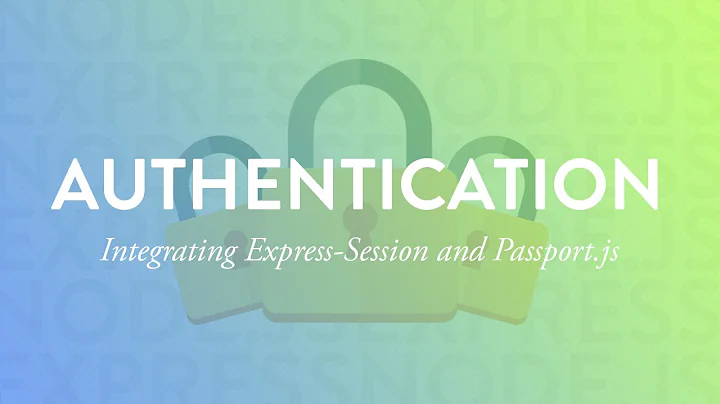Passport js fails to maintain session in cross-domain
Solution 1
I was having the same problem. Before configuring anything in express app, use the following(exactly the same) to set header of response for cross-domain :
app.use(function(req, res, next) {
res.header('Access-Control-Allow-Credentials', true);
res.header('Access-Control-Allow-Origin', req.headers.origin);
res.header('Access-Control-Allow-Methods', 'GET,PUT,POST,DELETE');
res.header('Access-Control-Allow-Headers', 'X-Requested-With, X-HTTP-Method-Override, Content-Type, Accept');
if ('OPTIONS' == req.method) {
res.send(200);
} else {
next();
}
});
It works for me. Best of luck!
Solution 2
As per Sriharsha's answer:
Set
res.header("Access-Control-Allow-Credentials", "true");Make sure you pass the credentials in the client side call. For example for AJAX, add this to your call:
xhrFields: {withCredentials: true},
Additionally:
-
Don't use the wildcard for Access-Control-Allow-Origin with a credentialed request
As explained on MDN:
when responding to a credentialed request, server must specify a domain, and cannot use wild carding
I use this file, and call it from my main module with require("./enable-cors.js")(app);
// enable-cors.js
module.exports = function(app) {
var methodOverride = require('method-override')
app.use(methodOverride());
var allowCrossDomain = function(req, res, next) {
res.header('Access-Control-Allow-Credentials', true);
res.header('Access-Control-Allow-Origin', req.headers.origin);
res.header('Access-Control-Allow-Methods', 'GET,PUT,POST,DELETE');
res.header('Access-Control-Allow-Headers', 'Content-Type, Authorization');
// intercept OPTIONS method
if ('OPTIONS' == req.method) {
res.send(200);
}
else {
next();
}
};
app.use(allowCrossDomain);
// Built upon: http://cuppster.com/2012/04/10/cors-middleware-for-node-js-and-express/#sthash.WdJmNaRA.dpuf
};
Solution 3
Allow the credentials to be shared by setting Access-Control-Allow-Credentials header. (I am not sure why you have commented in your code)
res.header("Access-Control-Allow-Credentials", "true");
then pass the credentials from javascript through XHR object.
xhr.withCredentials = true;
Related videos on Youtube
Kundu
Updated on September 14, 2022Comments
-
Kundu over 1 year
I am using passport JS, express and mongoose to make an API. When I test it in same domain it maintain session and works fine. But in cross domain it fails. Any clue how can i maintain the session in cross domain using the same configuration. Following is the code
allowCrossDomain = function(req, res, next) { res.header("Access-Control-Allow-Origin", "*"); res.header("Access-Control-Allow-Methods", "GET, POST, PUT, DELETE, OPTIONS"); res.header("Access-Control-Allow-Headers", req.headers["access-control-request-headers"]); // res.header("Access-Control-Allow-Credentials", "true"); if ("OPTIONS" == req.method) { res.send(200); } else { next(); } //allow all crossDomain request app.use(allowCrossDomain); //session handling app.use(express.cookieParser("gallery")); app.use(express.session()); app.use(passport.initialize()); app.use(passport.session()); app.use(function(req, res, next) { // check if client sent cookie var cookie = req.cookies.cokkieName; if (cookie === undefined) { //set up cookie here by a random number }); } next(); // <-- important! }); passport.use(new LocalStrategy({ usernameField: "email" }, function(email, password, done) { User.authenticate(email, password, function(err, reply) { //authenticate user and call the callback return done(err, false); }); })); passport.serializeUser(function(user, done) { return done(null, user._id); }); passport.deserializeUser(function(id, done) { //find user via id and return the user details return done(null, user._id); }); app.post("/login", function(req, res, next) { passport.authenticate("local", function(err, data, info) { //custom callback user.getProfile(req, res, next, err, data, info); })(req, res, next); });







![#06 | [New] Sử dụng Passport.js trong Authentication - RHP Team](https://i.ytimg.com/vi/DS5Mdqw-bQE/hq720.jpg?sqp=-oaymwEcCNAFEJQDSFXyq4qpAw4IARUAAIhCGAFwAcABBg==&rs=AOn4CLDTaxvAhJuzGgpHyLRTEtN5P36-hA)